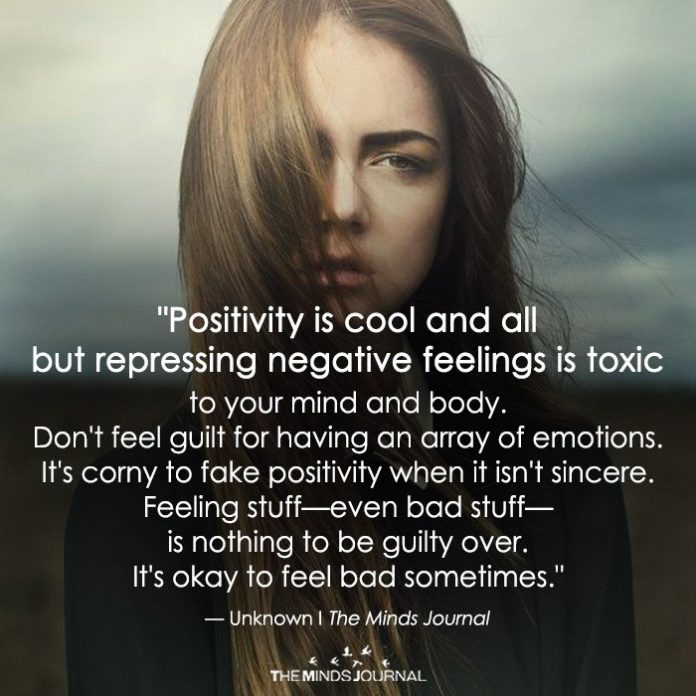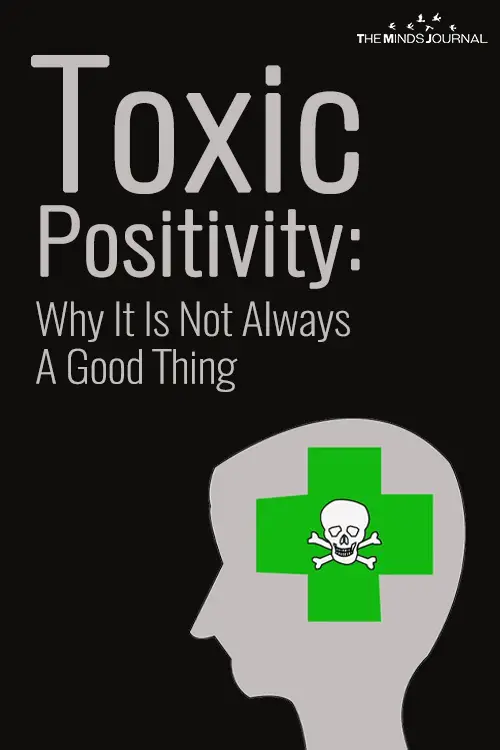Being positive is the key to living a motivated and happy life, and positivity is crucial for dealing with the several hiccups that life tends to throw our way. However, too much of anything is not good.
How being positive all the time can be negative for your mental health.
Toxic positivity or the need to feel positive all the time, no matter how negative the situation is, can be detrimental for you, mentally.
In the age of social media, we constantly see friends and family post about “having a positive attitude” or “having a positive outlook on life, all the time!” Being upbeat at times may be important, but it may come as a surprise to some that it is both okay and important to feel your more difficult feelings.
“Positivity can be toxic. If you are hoping for the best, you will be let down when the worst happens.”
The phrase “toxic positivity” refers to the concept that keeping positive, and keeping positive only, is the right way to live your life.
It means only focusing on positive things and rejecting anything that may trigger negative emotions. But that sounds pretty good, right? Not so fast.

Read The Horror Of Toxic Positivity: Why Positive Thinking Can Be Harmful
When you deny or avoid unpleasant emotions, you make them bigger.
Avoiding negative emotions reinforces this idea: Because you avoid feeling them, you tell yourself that you don’t need to pay attention to them. While you are trapped in this cycle, these emotions become bigger and more significant as they remain unprocessed. But this approach is simply unsustainable. Evolutionarily, we as humans cannot program ourselves to only feel happy.
By avoiding difficult emotions, you lose valuable information.
For example, when you are scared, your emotions are telling you, “Be aware of your surroundings.” Emotions themselves are information; They give you a snapshot of what is going on at a given moment, but they don’t tell you exactly what to do or how to react.
For example, if I am afraid of a dog and I see one up ahead on the sidewalk, that doesn’t mean I have to cross the street; it just means that I perceive the dog as a potential threat. Once a person identifies the emotion, he or she decides whether they want to avoid the dog or face the fear.
When people don’t pay attention to negative feelings, and then come across to others like they don’t have them, it makes them less approachable and relatable.
These people probably give off the impression that they don’t have any problems, which most people can intuit is not the case. You might find such a person annoying or difficult to connect with. Imagine trying to have a meaningful relationship with someone who ignored sadness or anxiety.
What to Do Instead
Accepting difficult emotions helps with coping and with decreasing the intensity of those emotions. Think about how good it feels when you can finally talk about how hard your day was with your partner, parent, or friend. Getting things off your chest, including negative things, is like lifting a weight from your shoulders, even if it’s more difficult than pretending everything is fine.
Emotions are not “good” or “bad,” all positive or all negative. Instead, think of them as guidance: Emotions help us make sense of things. If you’re sad about leaving a job, it probably means that experience was meaningful. If you feel anxious about a presentation, it probably means you care about how you are perceived.
“I’d rather be whole than good.” – Carl Jung
Emotions are not only a way for our minds to clue us into what’s happening; they also convey information to the people around us. If we are sad, it pulls for comfort. If we communicate guilt, it pulls for forgiveness.
Read Positivity Is Cool And All But Repressing Negative Feelings Is Toxic
While it may be beneficial to try to look on the bright side of things and find the silver lining in all life experiences, it’s important to also acknowledge and listen to our emotions when they aren’t as pleasant.
No one can be a ray of sunshine 24/7; humans just don’t work that way. In fact, paying attention and processing your emotions as they come and go may help you better understand yourself, and those around you.
Written By Konstantin Lukin Ph.D.
Originally Appeared In Psychology Today
Don’t let people fool you into believing that in order to have a good life, you need to practice toxic positivity.
You need to feel all your emotions, and only then will you be able to understand them and find ways to deal with them. Otherwise, you are just delaying the inevitable, which will cause you more pain in the future.
If you want to know more about toxic positivity, watch this video below:










Leave a Reply
You must be logged in to post a comment.